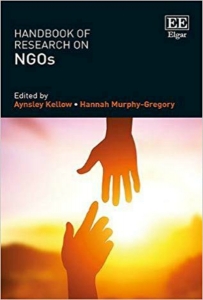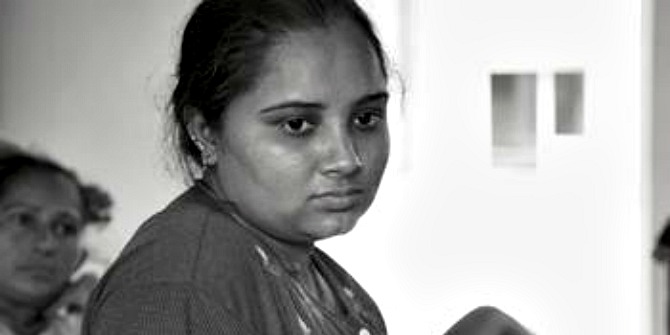In the Handbook of Research on NGOs, editors Aynsley Kellow and Hannah Murphy-Gregory offer a volume that explores both the contributions of international non-governmental organisations (NGOs) and the issues that have arisen in their development. In examining the fault lines in contemporary NGOs, the book is full of insightful analyses and will further readers’ understanding, writes Ebru Demir.
Handbook of Research on NGOs. Aynsley Kellow and Hannah Murphy-Gregory (eds). Edward Elgar Publishing. 2018.
Non-governmental organisations (NGOs) have been regarded with suspicion by different actors at different times. However, with the OXFAM crisis in February 2018, once again NGOs have been put under the spotlight. The publication of the Handbook of Research on NGOs, edited by Aynsley Kellow and Hannah Murphy-Gregory, is therefore timely in providing insights into the fault lines in NGOs.
The book focuses only on NGOs operating at the international level and shows that during the development of these, credibility and suspicion have gone hand-in-hand. NGOs have contributed immensely to the development of international human rights law (see Chapters Two and Three). Human rights agreements and international conventions, such as the UN Convention on the Elimination of All Forms of Discrimination Against Women (CEDAW) (1979), the International Convention for the Protection of All Persons from Enforced Disappearances (1992), the International Convention on the Protection of the Rights of All Migrant Workers and Members of their Families (1990) and the Convention for the Rights of Persons with Disabilities (2006), have all been put on the international agenda thanks to NGOs such as Amnesty International and Human Rights Watch (209-10).
After the wars in the 1990s in Rwanda and the former Yugoslavia, NGOs started to reveal the strong links between women and security. NGOs relating to women’s rights actively participated in the discussions at the World Conference on Women held in Beijing in 1995, which became an important step for the adoption of UN Security Council Resolution (SCR) 1325 in December 2000. SCR 1325 and subsequent resolutions have drawn attention to the ways in which wars and harms in wartime are gendered. As argued in Chapter Seven, because of the endeavours of women’s groups and the pressure they have applied, these resolutions were followed by the recognition of sexual violence as a war crime by the International Criminal Court (ICC) Rome Statute in 2002.
Although NGOs’ contributions to human rights and gender equality, amongst other areas, cannot be overstated, many problems and much suspicion have also arisen along the way. The underlying reasons for these are examined in different chapters under various themes in the Handbook. As underlined by the editors in Chapter One, NGOs remain ‘North’-centric in terms of values, priorities and headquarters (4). ‘Professional’, ‘donor-driven’ and depoliticised NGOs become detached from the societies with which they are concerned and, as a result, provide unhelpful ‘solutions’.
 Image Credit: (Pixabay CCO)
Image Credit: (Pixabay CCO)
Chapter Seven, authored by Jutta Joachim, engages with the ‘NGO boom’ in conflict and post-conflict societies. When states lose their legitimacy as a result of a failure to fulfil their duties, it is easier for NGOs to gain legitimacy by replacing public sector policies. The sort of attitude that NGOs should develop towards states is a highly debated issue in the development studies literature. The ‘replacement’ issue is further discussed and the relationship between states and NGOs scrutinised in Chapter Ten by Anja Mihr.
Mihr’s chapter and Dennis Redeker and Kerstin Martens in Chapter 15 compel the reader to think about various critical points which are often taken for granted. For instance, the legitimacy of NGOs is an important but often underemphasised issue. Crucial questions are posed in these chapters regarding the legitimacy of NGOs: where do NGOs get their legitimacy from? How can an NGO claim to be representing the interests of a group of people without their consent or request? Many NGOs seek to gain legitimacy by ‘entering into consultative status with the United Nations by securing access to information and UN staff as well as gaining legitimacy in the eyes of the general public’ (310-11). However, the extent to which the UN, another very problematic organisation holding a poor human rights record itself, can provide legitimacy to other NGOs by association is very much open to question.
What makes this book important for the existing literature is that the capabilities and capacities of NGOs are taken into consideration in the analyses. The book highlights the fact that today most NGOs work under a business model. In the early days of NGOs, credibility and trust followed from ‘voluntary civic engagement without second thoughts on personal benefit’ (197). We are far away from this system today. ‘To continue their work and to legitimize their existence’, NGOs might ‘miss out’ the root causes of the problems and therefore provide only band-aid solutions in the field (Mihr, 209). Similarly, to sustain their roles, NGOs might seek funding from states. In current practice, internationally well-known and credible sponsors, such as UN Women, provide very short-term funding for NGOs on the ground. This forces NGOs to align with governments and local bodies. Such alignments leave a question mark in people’s minds regarding the ‘independence’ and ‘impartiality’ of NGOs (see, in particular, Chapter 15). However, the volume asks whether we can realistically expect NGOs to keep their distance from governments in the long term and still exist.
This handbook covers key issues relating to NGOs. Each chapter either addresses one topic or focuses on one specific area of expertise, from gender to the environment, from tax to religion. By engaging with such timely subjects, the book motivates readers to dwell on what NGOs in fact have capacity for and the extent to which, if at all, they can remain independent and impartial in their work. In this respect, the Handbook of Research on NGOs provides insightful analyses and furthers readers’ understanding of NGOs.
Ebru Demir is a third-year PhD student and Associate Tutor at University of Sussex, Law School. Her research areas are transitional justice; transformative justice; women, peace and security; and peacebuilding in Bosnia and Herzegovina. Read more by Ebru Demir.
Note: This review gives the views of the author, and not the position of the LSE Review of Books blog, or of the London School of Economics.


 Find this book:
Find this book: 




